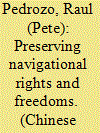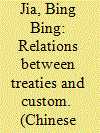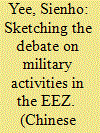| Srl | Item |
| 1 |
ID:
094108


|
|
|
|
|
| Publication |
2010.
|
| Summary/Abstract |
This paper considers aspects of the law and practice governing the nomination and election of judges of the International Court of Justice. The processes have led, over the last 85 or so years, to major changes in the composition of the Court. How are those changes to be related to the changing procedural and substantive challenges faced by the judges? This paper suggests possible, if provisional, answers to that large question, which is to be seen in the context of the long struggle to subject State power to law and legal process.
|
|
|
|
|
|
|
|
|
|
|
|
|
|
|
|
| 2 |
ID:
094106


|
|
|
|
|
| Publication |
2010.
|
| Summary/Abstract |
In recent years, maritime conflicts between China and the United States have occurred successively in the sea areas around China. Legally, these conflicts were caused by the different interpretation and application between the two countries of the LOS Convention or the customary international law rules reflected in the Convention, including mainly, firstly, jurisdiction over military activities, such as military surveys in the EEZ; and secondly, marine scientific research and classification of activities of marine data collection. China's practices conform with the Convention and the contemporary international practice. However, as a non-State-party to the Convention, the United States has taken advantage of the parts of the Convention that are in its own interests and is trying to escape from the relevant international legal obligations.
|
|
|
|
|
|
|
|
|
|
|
|
|
|
|
|
| 3 |
ID:
094111


|
|
|
|
|
| Publication |
2010.
|
| Summary/Abstract |
The issue of the Preah Vihear case (1962) in international law has long been debated, and even today creates tensions between Thailand and Cambodia. This article analyses Siam's position within the international law structure in the early twentieth century when the issue arose; it also reminds the reader of a tradition in international law theory which does not consider international law and municipal law as essentially different, and on this basis suggests that there is a regional (Buddhist) customary law and regional principles in Thailand and the surrounding regions of Southeast Asia that could profitably have been considered by the International Court of Justice.
|
|
|
|
|
|
|
|
|
|
|
|
|
|
|
|
| 4 |
ID:
094105


|
|
|
|
|
| Publication |
2010.
|
| Summary/Abstract |
China's views on coastal State authority in the exclusive economic zone (EEZ) are not supported by State practice, the negotiating history of the United Nations Convention on the Law of the Sea (UNCLOS), or a plain reading of Part V of the Convention. All nations may legitimately engage in military activities in foreign EEZs without prior notice to, or consent of, the coastal State concerned. Efforts were made during the negotiations of UNCLOS to broaden coastal State rights and jurisdiction in the EEZ to include security interests. However, the Conference rejected these efforts and the final text of the Convention (Article 58) ultimately preserved high seas freedoms of navigation and overflight and other internationally lawful uses of the seas related to those freedoms, to include military activities, in the EEZ.
|
|
|
|
|
|
|
|
|
|
|
|
|
|
|
|
| 5 |
ID:
094110


|
|
|
|
|
| Publication |
2010.
|
| Summary/Abstract |
The interplay between treaty and custom is a topic of great importance in practice and theory. An attempt at unravelling the intrigues involved in this interplay requires an understanding of the formal nature of the two sources of treaty and custom, and of the impact they exert upon each other in the search for applicable law in a concrete situation by government officials, judges and legislators. The separateness of these two sources is at times blurred, but shall always be maintained. Rules derived from both sources contribute to the body of international law, and they are rules of equal force. The rules thus derived may restrict each other in application and conflict in content, thus being conducive to incongruity in law, and may become asymmetrically opposed, as practice often outpaces or ignores treaty in response to evolving realities.
|
|
|
|
|
|
|
|
|
|
|
|
|
|
|
|
| 6 |
ID:
094104


|
|
|
|
|
| Publication |
2010.
|
| Summary/Abstract |
This Editorial Comment introduces the Agora: Military Activities in the EEZ featured in the March 2010 issue of the Chinese Journal of International Law and sketches the debate on the topic. It also highlights some arguments on pivotal issues, including (1) whether the existing framework of Part V of the LOS Convention, as a result of the existence of Article 59 on residual rights, favours the finding of a security interest of the coastal States to which others acting in the exclusive economic zone (EEZ) must pay due regard; and (2) whether the need to ensure the safety of the freedom of navigation favours the existence of the right to conduct "pure" oceanographic sea lane mapping by other States in the EEZ of a coastal State that is not prejudicial to the security interest of the coastal State.
|
|
|
|
|
|
|
|
|
|
|
|
|
|
|
|